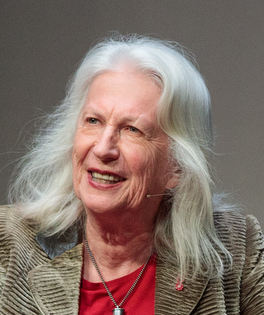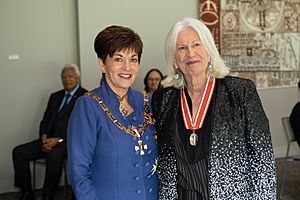Anne Salmond facts for kids
Quick facts for kids
Dame Anne Salmond
|
|
|---|---|

Salmond in 2018
|
|
| Born |
Mary Anne Thorpe
16 November 1945 Wellington, New Zealand
|
| Alma mater |
|
| Spouse(s) |
Jeremy Salmond
(m. 1971; died 2023) |
| Children | 3 |
| Relatives | James McDonald (great-grandfather) |
| Scientific career | |
| Institutions | University of Auckland |
| Thesis | Hui – a study of Maori ceremonial gatherings (1972) |
| Signature | |
 |
|
Dame Anne Salmond is a famous New Zealand expert in anthropology. Anthropology is the study of human societies and cultures. She was named New Zealander of the Year in 2013. In 2020, she received the Order of New Zealand, which is the highest honour in New Zealand.
Contents
Early Life and Family Connections
Anne Salmond was born Mary Anne Thorpe in Wellington, New Zealand, in 1945. She grew up in Gisborne. She went to Solway College and was the top student in 1961. She also spent time studying in the United States.
She studied at the University of Auckland and later earned her PhD from the University of Pennsylvania in 1972. Her PhD research was about Hui, which are special Māori ceremonial gatherings.
Anne became interested in early Māori history when she was a teenager. She realised she didn't know much about the Māori side of New Zealand's story. Her family has a long connection to the Māori world. Her great-grandfather, James McDonald, was a well-known photographer and artist who worked with important Māori leaders.
In 1971, Anne married Jeremy Salmond, who was an architect. They had three children and lived in Auckland. Jeremy passed away in 2023.
Anne Salmond's Career
In 2001, Anne Salmond became a special professor of Māori Studies and Anthropology at the University of Auckland. From 2002 to 2007, she was part of important groups like the Museum of New Zealand and the New Zealand Historic Places Trust. She also worked to help students from Māori, Pacific, and low-income families succeed in their education through a project called Starpath.
Important Books by Anne Salmond
Anne Salmond worked closely with Māori elders Eruera Stirling and Amiria Stirling. This led to three books about Māori life:
- Hui: A Study of Maori Ceremonial Gatherings (1975) – This book won an award for being excellent in Māori ethnology (the study of Māori culture).
- Amiria: The Life of a Maori Woman (1977) – This book won a Wattie Book of the Year Award.
- Eruera: Teachings of a Maori Elder (1981) – This book also won first prize at the Wattie Book of the Year Awards.
Later, Anne Salmond wrote about the first meetings between Māori and Europeans in New Zealand. Her books showed that Māori were active participants in these meetings, not just passive observers.
- Two Worlds: First Meetings Between Maori and Europeans 1642–1772 (1991) – This book won the National Book Award and an Australian History Award.
- Between Worlds: Early Exchanges Between Maori and Europeans 1773–1815 (1997) – This book also won the Ernest Scott Prize.
She then explored the early meetings between Pacific Islanders and European explorers.
- The Trial of the Cannibal Dog: The Remarkable Story of Captain Cook’s Encounters in the South Seas (2003) – This book won the history category at the Montana New Zealand Book Awards. It looks at how the relationship between Captain James Cook and Polynesians changed from friendly to difficult.
- Aphrodite's Island: the European Discovery of Tahiti (2010) – This book gives insights into Tahitian society in the 1700s and shows Tahitians as active participants in their interactions with Europeans.
- Bligh: William Bligh in the South Seas (2011) – This book explores the story of William Bligh and the mutiny on the Bounty. Anne Salmond describes Bligh as a skilled sailor and mapmaker who understood different cultures.
Her book Tears of Rangi: Experiments between Worlds (2017) explores different ways of seeing the world. It talks about how Māori and Pākehā (New Zealanders of European descent) ways of being can come together.
In 2018, she presented a history TV series called Artefact on Māori Television.
In 2021, Anne Salmond wrote a series about new ways for New Zealand to work together. She suggested that understanding the shared family lines in whakapapa (Māori genealogy) could help all people in New Zealand connect better. She also talked about how the Treaty of Waitangi could help bring together mātauranga Māori (Māori knowledge) and modern science.
In 2023, she published Knowledge is a Blessing on Your Mind: Selected Writings, 1980–2020. This book collects her writings and shows her journey as an anthropologist and a New Zealander.
Anne Salmond's Views on Public Issues
Anne Salmond often shares her thoughts on cultural interactions in New Zealand. She has discussed the history of white supremacy in New Zealand and also re-examined the story of Captain Cook's landing in 1769. She believes that while mistakes were made, Cook was not necessarily a "white supremacist."
In 2020, she spoke about building relationships in New Zealand based on concepts like aroha ('love') and kaitiakitanga ('guardianship'). She also supported the idea that under the Treaty of Waitangi, different cultures should be treated equally and woven together for everyone's benefit.
Anne Salmond is very involved in environmental issues. She helps protect parks and wilderness areas. With her husband, she started the Waikereru Ecosanctuary near Gisborne to restore nature. She is also a patron for Te Awaroa: 1000 Rivers, a project to restore 1000 New Zealand rivers by 2050.
She has spoken about protecting New Zealand's waterways. She believes that while water belongs to everyone, Māori have special connections to ancestral waterways. She argues that those who profit from using water should help protect it.
Anne Salmond also calls for "nature-based solutions" to climate change. She suggests restoring New Zealand's native forests, which are good for plants, animals, and storing carbon. She has questioned the current system that encourages planting large areas of pine trees, which can cause erosion and harm waterways. She believes the New Zealand Government should listen to scientists and consider the impact on local communities when making decisions about climate change.
Awards and Honours

Anne Salmond has received many awards for her work:
- In 1988, she was made a Commander of the Order of the British Empire for her contributions to literature and the Māori people.
- In 1995, she was promoted to Dame Commander of the Order of the British Empire for her historical research.
- In 2004, she received the Prime Minister's Award for Literary Achievement for non-fiction.
- In 2008, she became a Corresponding Fellow of the British Academy.
- In 2009, she became a Foreign Associate of the National Academy of Sciences. She was the first New Zealander to achieve both these honours.
- In 2013, she received the Rutherford Medal from the Royal Society of New Zealand. She was also named New Zealander of the Year for helping people understand different cultures.
- In 2015, she became an international member of the American Philosophical Society.
- In 2017, she was recognised as one of the Royal Society Te Apārangi's "150 women in 150 words" for her contributions to knowledge in New Zealand.
- In 2020, she received the Blake medal for her work in building understanding between Māori and Pākehā.
- In 2021, she was appointed to the Order of New Zealand, the highest honour in New Zealand.
- In 2024, she was the Honoured Writer at the Auckland Writers Festival.

